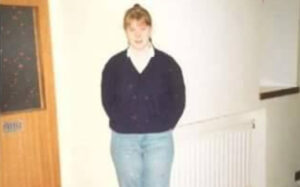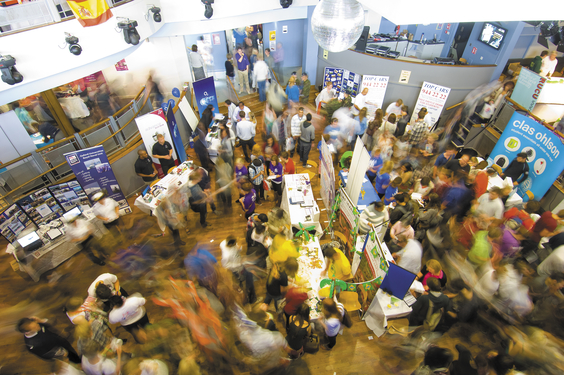CONNECTED speaks to graduate, Jacky Pearce, about her first year memories from Reading and the impact joining societies had on her university experience.
 Jacky, who studied Ancient History, joined Reading in 1990. Alongside her studies Jacky decided to make the most of her university experience and joined three societies – the Ski Club, the RAG (Raise and Give) Society and the Atrebates Society (now the Classics Society). Jacky found joining a variety of societies in her first year a great opportunity to really discover herself.
Jacky, who studied Ancient History, joined Reading in 1990. Alongside her studies Jacky decided to make the most of her university experience and joined three societies – the Ski Club, the RAG (Raise and Give) Society and the Atrebates Society (now the Classics Society). Jacky found joining a variety of societies in her first year a great opportunity to really discover herself.
A continued interest
Before joining Reading, Jacky was already a member of the Southampton Skistylers ski club and keen to continue while at university. “It was the largest freestyle ski club of its kind in England, certainly at the time. We’d have weekly practice of both ballet and aerial freestyle skiing. The aerials became an Olympic sport and I got to train with some members of the British Squad and Olympian Richard Cobbing when he was in the area,” she explained.
As soon as she had the chance, she sought out a ski club at Reading. She remembered: “We always went to the nearby Bracknell Ski Centre, although, understandably, there was no option to practice the more dangerous aerials.
“I was the only freestyler, doing leg breakers, front tip rolls, spins and the occasional jump over my poles. I’d have to walk across campus with my specialist skis and poles each week to our collection point.”
Jacky was grateful for the chance Reading gave her to continue with the interests she had acquired prior to university. She said:
“It’s great that the University has a range of clubs and societies to help you keep up with your favourite interests. I certainly appreciated it.”
In the name of charity
As well as keeping up with her existing interests, Jacky also threw herself into new adventures and joined the RAG Society. RAG raises money for various local, national and international charities. For Jacky, joining RAG was a memorable moment.
Jacky said: “RAG was important to me as I really wanted to help raise money. I joined a little way into my first year, and before the end of the year had been asked to join the committee as the Charities Co-ordinator. I was thrilled as no other committee member was in their first year.
“My job was to receive all the letters from charities asking for help – the ‘begging letters‘ as they were known – and to weed them down to a shortlist for the committee to vote on.”
Throughout the years the RAG Society has been known for its more creative forms of fundraising, including the famous RAG week, which is a week-long fundraising event. Jacky recalls the RAG carnival and how the RAG Society would go national.
Jacky said: “There would be floats to represent different halls, which would be decorated and paraded around town to raise money. Unfortunately, as I was in Wessex Hall, the smallest hall, our float was very basic.
“The national RAG Raid was where universities across the country descended on London for the day, trying to get as many people as possible to donate. By the end of the day, I think the vast majority of London was wearing a RAG sticker, if only to ward off more Raggers from getting them to open their purses and wallets!” Jacky explained. But it wasn’t all fun and games. Jacky said:
“The fun stopped when I had to seriously go through the various charities’ letters. There was no way we could help them all, even with the best will in the world, and I felt so guilty about that.
“There was me, still a teenager, with all this responsibility and so many charities were so worthy.”
Something different
Jacky’s university experience wasn’t all fundraising. She also joined a society related to her studies called the Atrebates Society – the Classics Society which took their name from the large tribe (the Atrebates) during the late Iron Age and Roman period.
Jacky recalled the events led by the “indomitable” Professor Tessa Rajak. She said: “That marvellous indomitable professor with the heart of a slush puppy, specialised in ancient religion.
“One thing she wanted to do was an Atrebates procession , involving all the members of the society, and shown to whomever would come to watch.”
Jacky found herself in a key role in this show. She said: “I played the role of the ‘blameless maiden’ and even lecturers weren’t safe from partaking in the performance. Professor Andrew Wallace-Hadrill was turned into Pan himself, the satyr god. A satyr is or was a nature god, depending on your beliefs, who walked upright with the top half of a man and the lower limbs of a goat.
“The professor was Head of the Department. He was fierce in his seminars if you hadn’t done the work, but was also a jolly good sport and he was great fun during the performance.”
For Jacky, joining a society was a key part of her university experience.
She said: “My memories of the planning and especially that of the performance evening itself are that it was great fun, something very different and yet still educational to be a part of.
“The societies at university give you the opportunity to discover yourself and discover what is important to you in your first time living away from home. I grew both emotionally and in maturity far more in that first year than in any time before or since.”
Did you join a society while studying at the University of Reading? Contact us and share your story.




